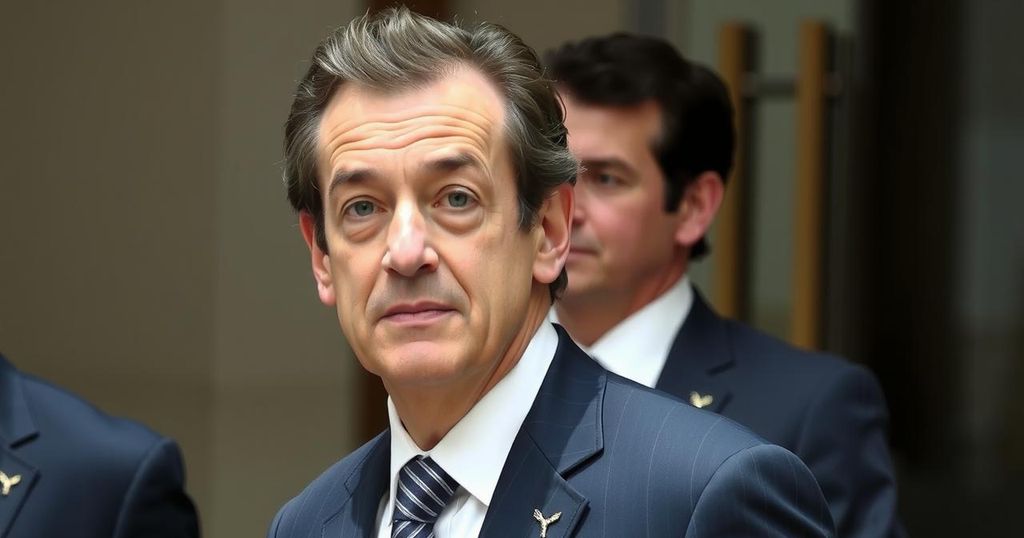Nicolas Sarkozy on Trial for Alleged Gaddafi Campaign Funding
Nicolas Sarkozy has begun his trial in Paris over allegations of receiving €50 million in illicit funds from Muammar Gaddafi for his 2007 election campaign. He denies the charges, claiming they are politically motivated. The trial involves twelve others and could lead to a ten-year prison sentence if found guilty. Cases against Sarkozy have intensified following his 2012 election loss, raising serious legal and reputational challenges for the former president.
Former French President Nicolas Sarkozy commenced trial proceedings in Paris regarding allegations of receiving significant illicit funds from the late Libyan leader Muammar Gaddafi to finance his 2007 presidential campaign. The prosecution contends that in return for these funds, Mr. Sarkozy offered to assist Gaddafi in improving his image in the eyes of Western nations. Sarkozy, aged 69, who served as the President of France from 2007 until 2012, has consistently denied these charges and attributes them to adversaries seeking to undermine him.
The investigation into these claims began in 2013, following accusations made by Saif al-Islam, Gaddafi’s son, that Sarkozy had accepted millions from his father for electoral purposes. Subsequently, Lebanese businessman Ziad Takieddine alleged that he possessed evidence indicating that Sarkozy’s campaign was extensively financed by the Libyan regime, claiming that €50 million in payments continued during Sarkozy’s presidency. Alongside Sarkozy, twelve other individuals, accused of conspiring with Gaddafi, are also facing trial; they too reject the charges leveled against them.
Furthermore, Carla Bruni-Sarkozy, former model and singer, has been implicated in the case, accused of concealing evidence and colluding in fraudulent activities, both of which she denies. Since his defeat in the 2012 presidential election, Sarkozy has been subjected to numerous criminal investigations. He has previously appealed a judgment from February 2024 that convicted him of overspending his campaign finances and of attempting to obscure the facts surrounding it, which resulted in a one-year prison sentence.
In 2021, Sarkozy was also convicted for attempting to bribe a judge in a separate inquiry, making him the first former French president to receive a custodial sentence; however, the Paris appeals court later decided that he could serve his sentence at home wearing an electronic tracking device instead of in prison. As he arrived at the court today, he was not wearing this device, although it is anticipated that he may do so during the upcoming trial sessions. The trial is scheduled to continue until April 10, and should Sarkozy be found guilty, he could face a maximum sentence of ten years in prison.
The trial of Nicolas Sarkozy is rooted in serious allegations that suggest he received illicit financial support from Libyan leader Muammar Gaddafi during his successful 2007 presidential campaign. This investigation, initiated in 2013, stems from accusations dating back to 2011 wherein Gaddafi’s son publicly claimed that Sarkozy had accepted significant monetary contributions from Libya. The extensive nature of these allegations has led to various legal battles for Sarkozy, exacerbating his political and personal challenges since leaving office. The ramifications of a guilty verdict could heavily impact his reputation and legacy as a former leader of France.
In summary, the ongoing trial of Nicolas Sarkozy represents a significant judicial moment, as it assesses the legality of his presidential election funding in connection with alleged dealings involving Gaddafi. With multiple investigations and legal challenges clouding Sarkozy’s post-presidency, this trial may determine not only his future but also the political landscape in France. The implications of any potential conviction could resonate deeply within the realms of French politics and legal accountability for public figures.
Original Source: www.bbc.com




Post Comment